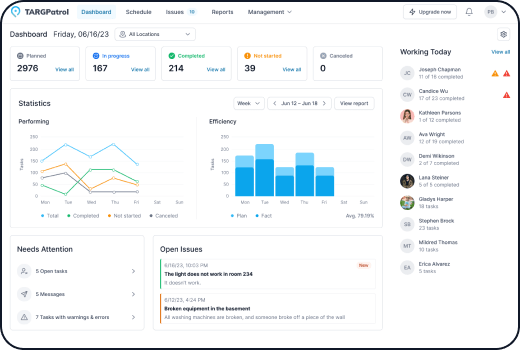- Number of workshops: 17
- Employees: 3,000+
- Task: Task Management System
- Identification: RFID
Control system for scheduled maintenance work on equipment and systems at OAO “Malaysia Cement Plant” based on TARGPatrol products. OAO “Malaysia Cement Plant” is one of the top three cement production facilities in Malaysia. The plant covers an area of 129.1 hectares and consists of four main workshops and thirteen auxiliary units.
Tasks and Requirements To ensure uninterrupted plant operation, reduce equipment failure incidents, potential production line downtime, and increase staff accountability, the plant management has set the task of implementing a system using technology.
A simplified solution model looks as follows: RFID points are installed on objects and/or premises throughout the plant. Responsible employees conduct inspections in accordance with the regulations, aimed at monitoring and/or preventing equipment and/or system malfunctions. Once the task, as defined by the regulations, is completed, the employee scans the RFID point, and the information is transmitted to the central system.
Within the project, it is necessary to install 1000 temperature-resistant RFID points throughout the plant. The personnel responsible for scheduled maintenance tasks should be equipped with RFID point readers. In the initial phase of the project, 50 reader units will be used. The choice of equipment is determined by the set tasks and the challenging operating conditions: high temperatures, increased humidity in certain production areas, and the presence of fine dust throughout the plant’s premises.
As part of the project, the plant needs software with a wide range of functionalities, including:
Creating employee work schedules. Creating equipment maintenance schedules. Accurate recording of arrival and stay times of employees at monitored objects or premises. Generating reports for workshops, departments, and teams, as well as individual employees. Setting up regulations, tracking and controlling compliance with equipment maintenance regulations. Using the collected data for analysis and . Compiling reports both for the entire plant and for each individual point. Support for with installed and prospective points. Project Implementation The project implementation is divided into three phases:
Equipment installation. Implementation and software configuration, process optimization, and documentation. System development. The client has been offered temperature-resistant RFID points with an operational temperature range from -20 to 200 degrees Celsius. The points are affixed to surfaces using fasteners. A rugged smartphone with IP68 protection class has been proposed as the reading device. Choosing a smartphone with Android OS and NFC technology support as the reading device allows for significantly expanding the system’s functionality compared to using a traditional RFID point scanner, at a relatively comparable cost. To optimize the enterprise’s server infrastructure expenses, software maintenance, obtain up-to-date updates, and provide a high-level technical support, a decision was made to host the software on the developer’s server resources.
For responsible client employees to access the system, there is no need to install client-side software on the client’s work computers. A modern browser (including mobile) is sufficient. To facilitate the transfer of information from the reading devices, several implementation options were considered, both using mobile internet resources and setting up Wi-Fi zones. Given the specific nature of the enterprise, the option with mobile internet was chosen. In production areas where it’s not possible to connect to the mobile operator’s network, Wi-Fi zones have been established. This way, the client achieved full information transfer from the reading devices in real-time.
During the system implementation, work was carried out to optimize and modify business processes affecting the system’s operation. Training was provided to the enterprise’s responsible staff on how to use the system.
Results and Project Development Following the first two project stages, a system for controlling scheduled maintenance work on equipment and systems based on TARGPatrol products with the necessary functionality for the enterprise has been implemented. The client has addressed the following objectives:
Increasing the equipment and system fault tolerance. Enhancing equipment reliability through monitoring. Ensuring control over scheduled maintenance work. Obtaining various types of reports and analytics. The third stage anticipates project development. TARGPatrol software and the choice of an Android OS smartphone as the reading device allow for significant system expansion. Within the contractual agreements, the functionality and services that the client will receive during each subsequent year of service have been defined.
The result of the collaboration between OAO “Malaysia Cement Plant” and LLC “TS TECHNOLOGIES” (TARGPatrol brand) will be the automation of a significant portion of the enterprise’s business processes related to equipment monitoring, personnel management, and overall safety enhancement at OAO “Malaysia Cement Plant.” The selected progressive cooperation model will provide the client with comprehensive support, updates, and continuous modernization of the implemented systems.
